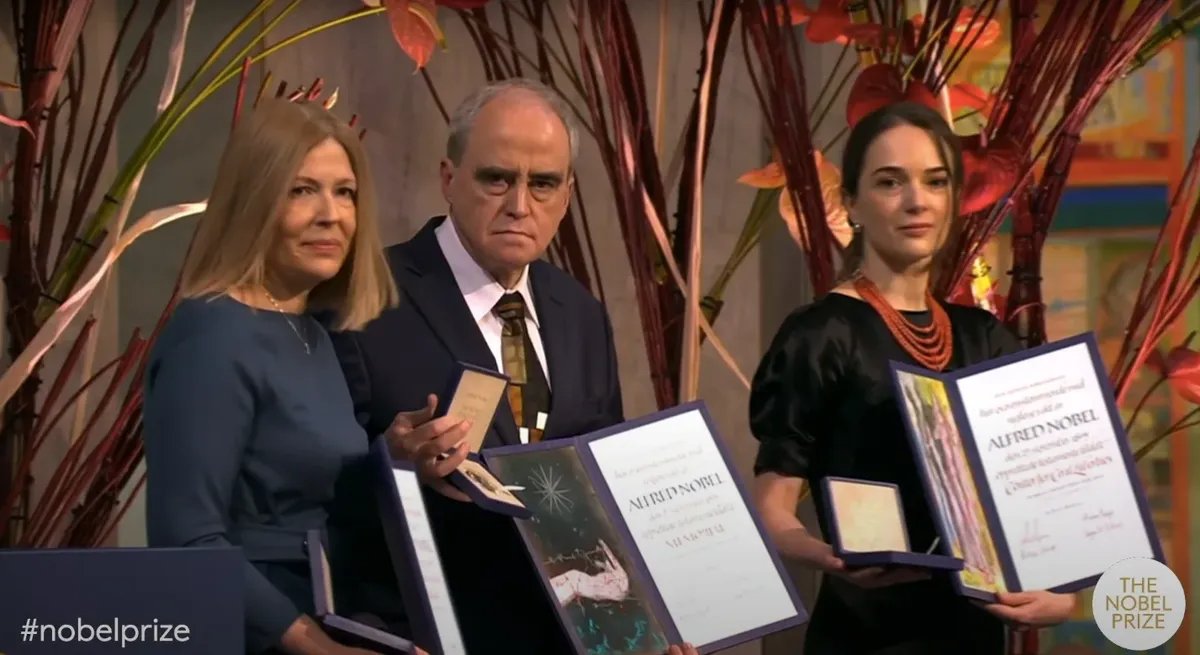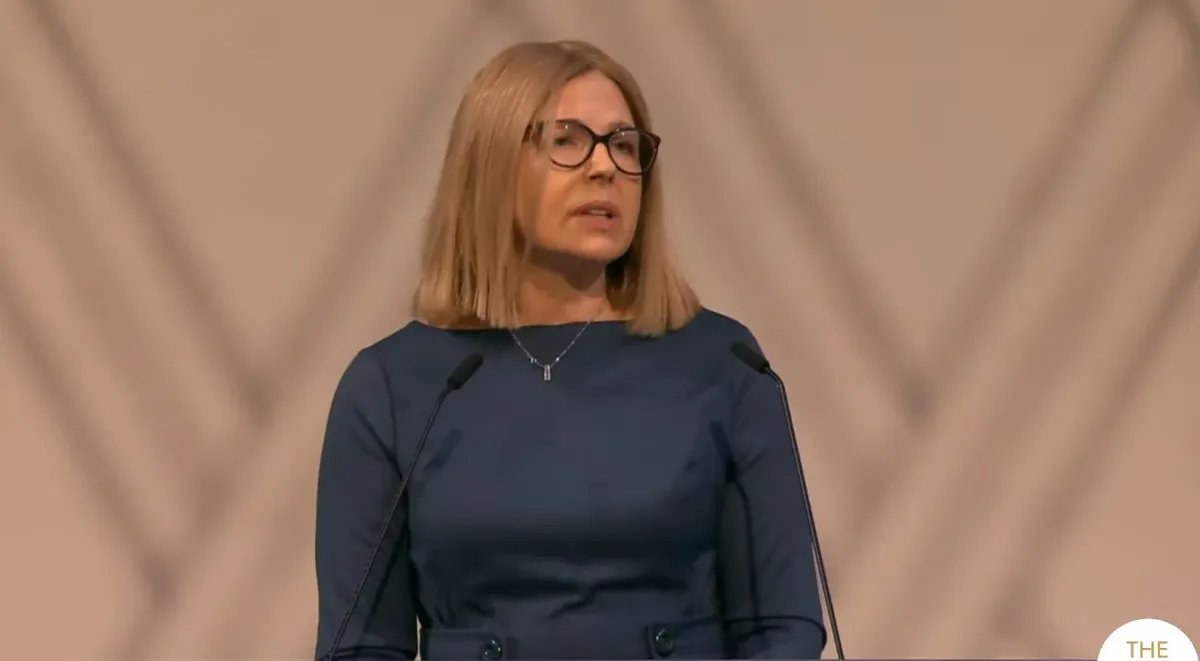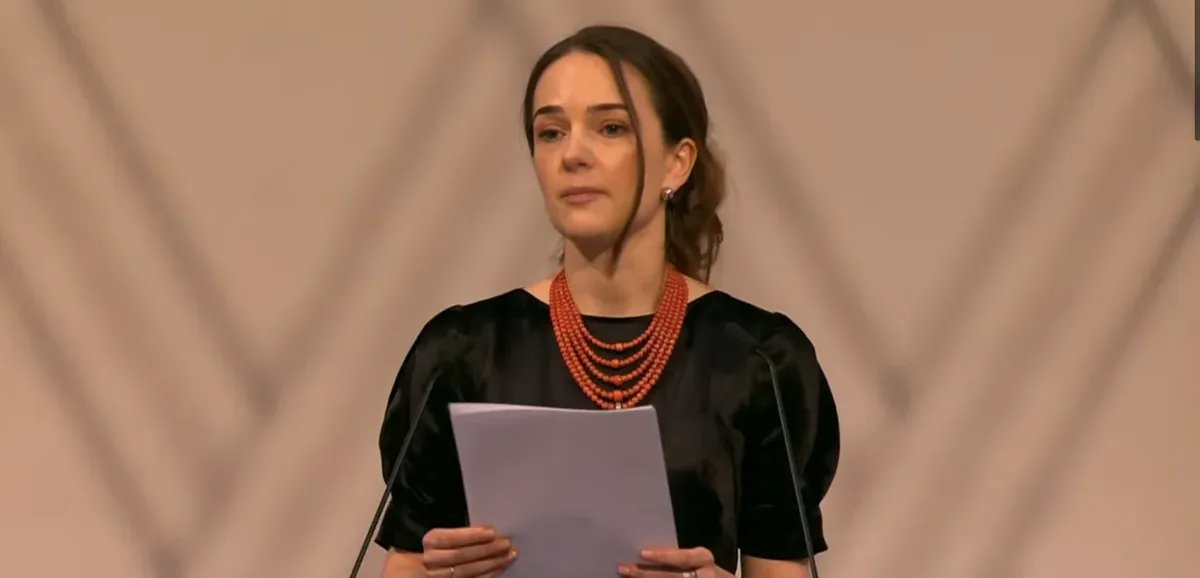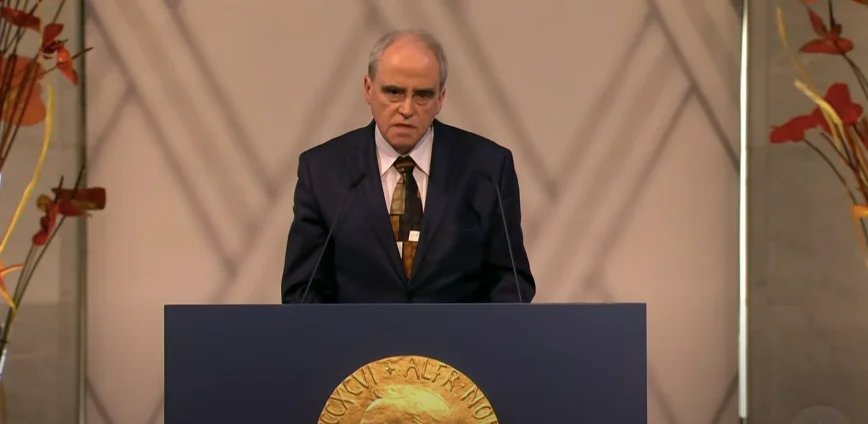Natalya Pinchuk of Belarus, Yan Rachinsky of Russia, and Oleksandra Matviichuk of Ukraine have received their Nobel Peace Prize medals in Oslo.

Natalya Pinchuk of Belarus, Yan Rachinsky of Russia, and Oleksandra Matviichuk of Ukraine (left to right). Photo screenshoted from the official broadcast
The 2022 Nobel Peace Prize was awarded jointly to Belarusian activist Ales Bialiatski, a Russian human rights organisation Memorial, and Ukraine’s Center for Civil Liberties. Bialiatski, who is currently imprisoned in his home country, was represented by his wife Natalya Pinchuk.

Photo screenshoted from the official broadcast
Pinchuk delivered a speech in Belarusian. “Ales is not the only one in prison. There thousands of Belarusians there, oppressed for their public stance. Hundreds of thousands were forced to leave the country only because they wanted to live in a democratic nation. There is a years-long war in Belarus with the state fighting against its own people, the Belarusian language, and the democratic values,” she said before she read a message from her husband.
“It so happens that the people who value freedom the most are often deprived of it. This prize belongs to all my colleagues involved in human rights movement, and dozens of thousands of Belarusians who have been tortured, arrested or imprisoned. This prize is an award for millions of Belarusian citizens who had rallied up to defend civil rights. It also serves as evidence of the dramatic situation with human rights in our country. Today, the permanent struggle between the good and the evil has expanded quintessentially in our entire region. It’s not enough to be educated and democracy-minded, it’s not enough to be humane and merciful. It is also necessary to be able to defend one’s properties and homeland. I know certainly what kind of a Ukraine would satisfy Russia and Putin: a dependent dictatorship, just like today’s Belarus, where the voice of the oppressed folk is not heard,” reads Bialiatski’s statement. His wife finished her speech, saying: “Freedom to the Belarusian people! Freedom to Vyasna! Long live Belarus!”

Photo screenshoted from the official broadcast
Oleksandra Matviichuk of Ukraine’s Centre for Civil Liberties said the following: "Our entire country was waiting for this year’s Nobel Peace Prize announcement. We consider this a recognition of the efforts of Ukraine’s people who have stood up bravely against attempts to destroy the peaceful development of Europe and also as a recognition of how important the work of human rights defenders is to anticipate the military menace worldwide. We are proud that today the Ukrainian language will be spoken at this ceremony for the first time in history. We are receiving a Nobel Peace Prize while there’s a war on. This war has been on for eight years, nine months, and twenty-one days.”

Photo screenshoted from the official broadcast
Memorial’s Yan Rachinsky also delivered a speech: “After the Soviet Union broke up, the new countries that formed on its former territory had new historical narratives emerged, which contradicted the Soviet historical mythology. Soon after Vladimir Putin took power, the new Russian leadership and its ideological lackeys started boisterous ‘wars of memory’ against its neighbours: Estonia, Latvia, Ukraine, using the same old Soviet stereotypes and labels. Obviously, this was not done for the sake of ‘historical truth’, but for their own political ambitions. It ended up with the fight against ‘nationalism’ and ‘banderitism’ becoming an ideological excuse to start an insane, criminal, and rapacious war against Ukraine. Russia’s historical memory fell victim to this madness in the early days of war. Swapping the notions of ‘fascism’ and ‘anti-fascism’ was enough to distort the minds of Russia’s people, and now Russia’s mass media call an armoured invasion of a neighbouring country ‘antifascism’. Ukraine’s territories are being annexed, its people are being terrorised, war crimes are being committed. Russia spreads hatred towards Ukraine, its language and culture among Russian people, claiming that the Ukrainian people do not exist, and labelling the resistance as 'fascism”.
Rachinsky also added that Memorial’s members had doubts whether the organisation truly deserved the prize. “Although Memorial failed to stave off the 24 February tragedy, we’re not giving up and continuing our work,” he added.
It was revealed on 7 October that Bialiatski, Memorial, and Centre for Civil Liberties would receive this year’s Nobel Peace Prize. It was noted in the official statement of the Nobel Committee that the laureates “had for many years promoted the right to criticise power and protect the fundamental rights of citizens.”
"They have made an outstanding effort to document war crimes, human right abuses and the abuse of power. Together they demonstrate the significance of civil society for peace and democracy,” the committee’s statement read.
